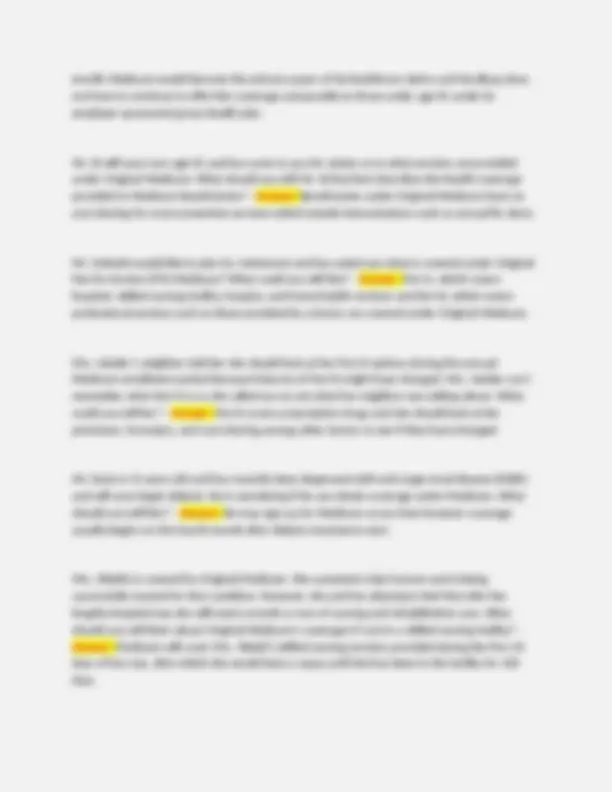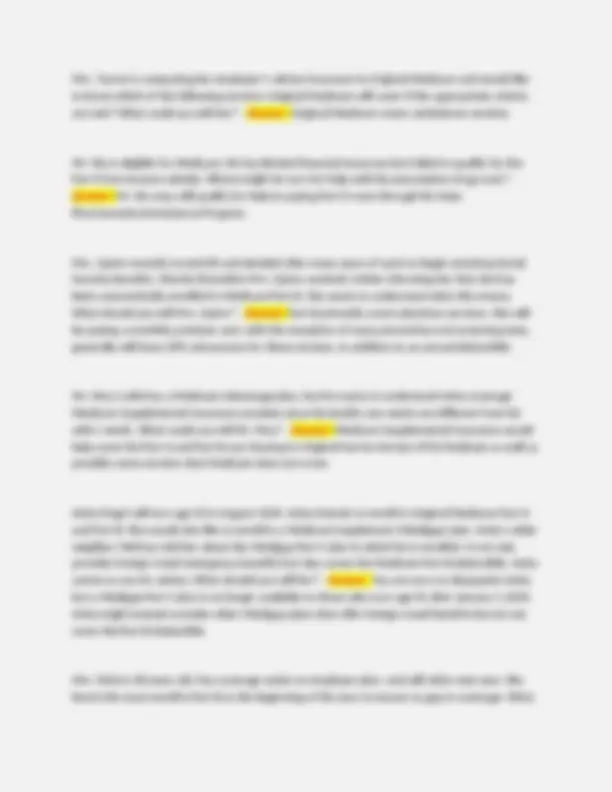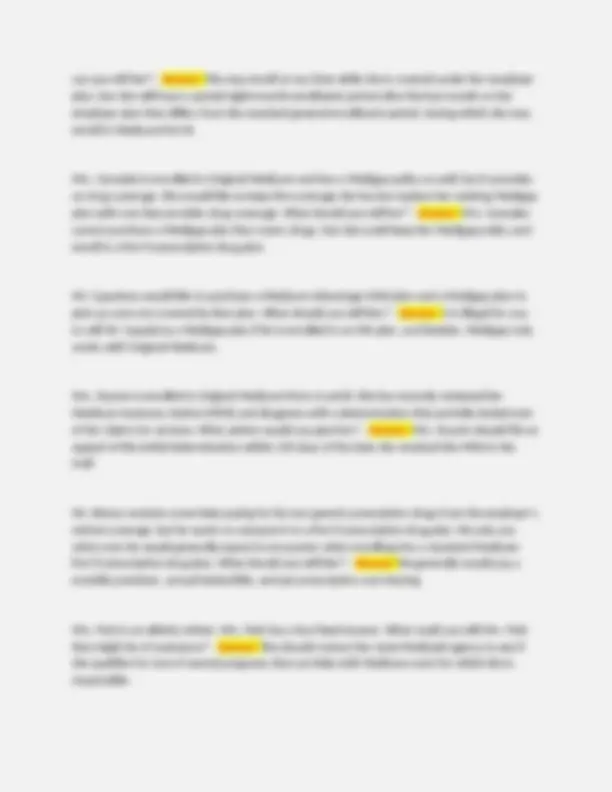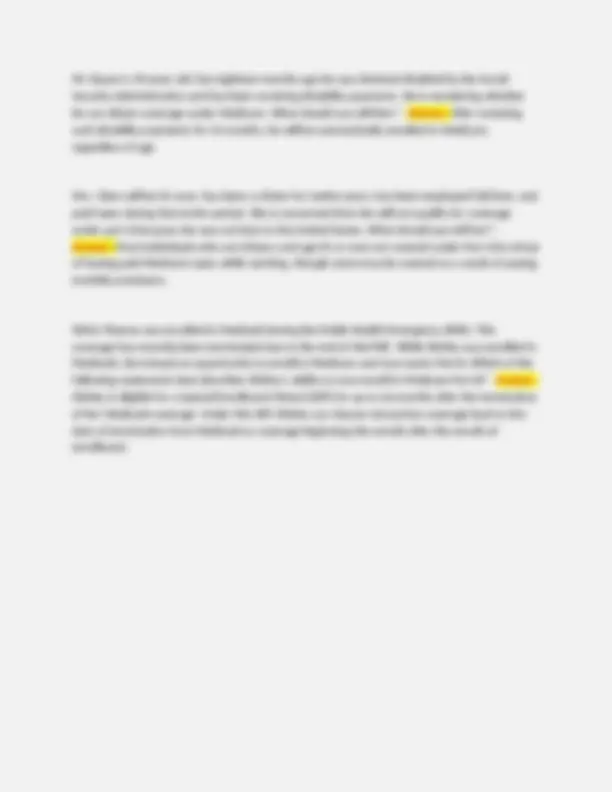






Study with the several resources on Docsity

Earn points by helping other students or get them with a premium plan


Prepare for your exams
Study with the several resources on Docsity

Earn points to download
Earn points by helping other students or get them with a premium plan
Community
Ask the community for help and clear up your study doubts
Discover the best universities in your country according to Docsity users
Free resources
Download our free guides on studying techniques, anxiety management strategies, and thesis advice from Docsity tutors
A series of questions and answers related to medicare coverage in the united states. it covers various aspects of medicare parts a, b, and d, including enrollment eligibility, coverage details for different services, and the role of medigap plans. The q&a format makes it useful for understanding the complexities of medicare and planning for retirement healthcare.
Typology: Exams
1 / 8

This page cannot be seen from the preview
Don't miss anything!





Mrs. Paterson is concerned about the deductibles and co-payments associated with Original Medicare. What can you tell her about Medigap as an option to address this concern? - Answer: Medigap plans help beneficiaries cover Original Medicare benefits, but they coordinate with Original Medicare coverage. Mr. Singh would like drug coverage but does not want to be enrolled in a Medicare Advantage plan. What should you tell him? - Answer: Mr. Singh can enroll in a stand-alone prescription drug plan and continue to be covered for Part A and Part B services through Original Fee-for- Service Medicare. Ms. Moore plans to retire when she turns 65 in a few months. She is in excellent health and will have considerable income when she retires. She is concerned that her income will make it impossible for her to qualify for Medicare. What could you tell her to address her concern? - Answer: Medicare is a program for people age 65 or older and those under age 65 with certain disabilities, end-stage renal disease, and Lou Gehrig's disease so she will be eligible for Medicare. Mr. Diaz continued working with his company and was insured under his employer's group plan until he reached age 68. He has heard that there is a premium penalty for those who did not sign up for Part B when first eligible and wants to know how much he will have to pay. What should you tell him? - Answer: Mr. Diaz will not pay any penalty because he had continuous coverage under his employer's plan. Agent John Miller is meeting with Jerry Smith, a new prospect. Jerry is currently enrolled in Medicare Parts A and B. Jerry has also purchased a Medicare Supplement (Medigap) plan which he has had for several years. However, the plan does not provide drug benefits. How would you advise Agent John Miller to proceed? - Answer: Tell prospect Jerry Smith that he should consider adding a standalone Part D prescription drug coverage policy to his present coverage.
Madeline Martinez was widowed several years ago. Her husband worked for many years and contributed into the Medicare system. He also left a substantial estate which provides Madeline with an annual income of approximately $130,000. Madeline, who has only worked part-time for the last three years, will soon turn age 65 and hopes to enroll in Original Medicare. She comes to you for advice. What should you tell her? - Answer: You should tell Madeline that she will be able to enroll in Medicare Part A without paying monthly premiums due to her husband's long work record and participation in the Medicare system. You should also tell Madeline that she will pay Part B premiums at more than the standard lowest rate but less than the highest rate due her substantial income. Mr. Bauer is 49 years old, but eighteen months ago he was declared disabled by the Social Security Administration and has been receiving disability payments. He is wondering whether he can obtain coverage under Medicare. What should you tell him? - Answer: After receiving such disability payments for 24 months, he will be automatically enrolled in Medicare, regardless of age. Mrs. Chen will be 65 soon, has been a citizen for twelve years, has been employed full time, and paid taxes during that entire period. She is concerned that she will not qualify for coverage under part A because she was not born in the United States. What should you tell her? - Answer: Most individuals who are citizens and age 65 or over are covered under Part A by virtue of having paid Medicare taxes while working, though some may be covered as a result of paying monthly premiums. What impact, if any, will recent regulatory changes have upon Medigap plans? - Answer: The Part B deductible will no longer be covered for individuals newly eligible for Medicare starting January 1, 2020. Juan Perez, who is turning age 65 next month, intends to work for several more years at Smallcap, Incorporated. Smallcap has a workforce of 15 employees and offers employer- sponsored healthcare coverage. Juan is a naturalized citizen and has contributed to the Medicare system for over 20 years. Juan asks you if he will be entitled to Medicare and if he enrolls how that will impact his employer-sponsored healthcare coverage. How would you respond? - Answer: Juan is likely to be eligible for Medicare once he turns age 65 and if he
Mrs. Turner is comparing her employer's retiree insurance to Original Medicare and would like to know which of the following services Original Medicare will cover if the appropriate criteria are met? What could you tell her? - Answer: Original Medicare covers ambulance services Mr. Wu is eligible for Medicare. He has limited financial resources but failed to qualify for the Part D low-income subsidy. Where might he turn for help with his prescription drug costs? - Answer: Mr. Wu may still qualify for help in paying Part D costs through his State Pharmaceutical Assistance Program. Mrs. Quinn recently turned 66 and decided after many years of work to begin receiving Social Security benefits. Shortly thereafter Mrs. Quinn received a letter informing her that she has been automatically enrolled in Medicare Part B. She wants to understand what this means. What should you tell Mrs. Quinn? - Answer: Part B primarily covers physician services. She will be paying a monthly premium and, with the exception of many preventive and screening tests, generally will have 20% coinsurance for these services, in addition to an annual deductible. Mr. Moy's wife has a Medicare Advantage plan, but he wants to understand what coverage Medicare Supplemental Insurance provides since his health care needs are different from his wife's needs. What could you tell Mr. Moy? - Answer: Medicare Supplemental Insurance would help cover his Part A and Part B cost sharing in Original Fee-for-Service (FFS) Medicare as well as possibly some services that Medicare does not cover. Anita Magri will turn age 65 in August 2020. Anita intends to enroll in Original Medicare Part A and Part B. She would also like to enroll in a Medicare Supplement (Medigap) plan. Anita's older neighbor Mel has told her about the Medigap Part F plan in which he is enrolled. It not only provides foreign travel emergency benefits but also covers his Medicare Part B deductible. Anita comes to you for advice. What should you tell her? - Answer: You are sorry to disappoint Anita but a Medigap Part F plan is no longer available to those who turn age 65 after January 1,2020. Anita might instead consider other Medigap plans that offer foreign travel benefits but do not cover the Part B deductible. Mrs. Peňa is 66 years old, has coverage under an employer plan, and will retire next year. She heard she must enroll in Part B at the beginning of the year to ensure no gap in coverage. What
can you tell her? - Answer: She may enroll at any time while she is covered under her employer plan, but she will have a special eight-month enrollment period after the last month on her employer plan that differs from the standard general enrollment period, during which she may enroll in Medicare Part B. Mrs. Gonzalez is enrolled in Original Medicare and has a Medigap policy as well, but it provides no drug coverage. She would like to keep the coverage she has but replace her existing Medigap plan with one that provides drug coverage. What should you tell her? - Answer: Mrs. Gonzalez cannot purchase a Medigap plan that covers drugs, but she could keep her Medigap policy and enroll in a Part D prescription drug plan. Mr. Capadona would like to purchase a Medicare Advantage (MA) plan and a Medigap plan to pick up costs not covered by that plan. What should you tell him? - Answer: It is illegal for you to sell Mr. Capadona a Medigap plan if he is enrolled in an MA plan, and besides, Medigap only works with Original Medicare. Mrs. Duarte is enrolled in Original Medicare Parts A and B. She has recently reviewed her Medicare Summary Notice (MSN) and disagrees with a determination that partially denied one of her claims for services. What advice would you give her? - Answer: Mrs. Duarte should file an appeal of this initial determination within 120 days of the date she received the MSN in the mail. Mr. Alonso receives some help paying for his two generic prescription drugs from his employer's retiree coverage, but he wants to compare it to a Part D prescription drug plan. He asks you what costs he would generally expect to encounter when enrolling into a standard Medicare Part D prescription drug plan. What should you tell him? - Answer: He generally would pay a monthly premium, annual deductible, and per-prescription cost-sharing. Mrs. Park is an elderly retiree. Mrs. Park has a low fixed income. What could you tell Mrs. Park that might be of assistance? - Answer: She should contact her state Medicaid agency to see if she qualifies for one of several programs that can help with Medicare costs for which she is responsible.
disease. Mr. Buck will need to check specific tests before obtaining them to see if they will be covered. Anthony Boniface turned 65 in 2023. He was not receiving Social Security or Railroad Retirement Benefits on his 65th birthday. He was interested in obtaining Medicare coverage and is eligible for premium-free Part A. Before he could enroll in Medicare, his entire area was impacted by a hurricane causing massive flooding and severe wind damage. The Federal government declared this to be a natural disaster which has recently ended. During this period Anthony's initial enrollment period expired. Anthony asks you how he can now obtain Medicare coverage. What should you say? - Answer: Anthony is eligible for a special enrollment period (SEP) because he missed an enrollment period due to the impact of the Federally declared disaster. This SEP will allow Anthony to enroll in Part B up to six months after the end of the emergency declaration. Anthony may enroll in premium-free Part A at any time and his Part A coverage will be retroactive for up to 6 months. Edward IP suffered from serious kidney disease. As a result. Edward became eligible for Medicare coverage due to end-stage renal disease (ESRD). A close relative donated their kidney and Edward successfully underwent transplant surgery 12 months ago. Edward is now age 50 and asks you if his Medicare coverage will continue, what should you say? - Answer: Individuals eligible for Medicare based on ESRD generally lose eligibility 36 months after the month in which the individual receives a kidney transplant unless they are eligible for Medicare on another basis such as age or disability. Edward may, however, remain enrolled in Part B but solely for coverage of immunosuppressive drugs if he has no other health care coverage that would cover the drugs. Mildred Savage enrolled in Allcare Medicare Advantage plan several years ago. Mildred recently learned that she is suffering from inoperable cancer and has just a few months to live. She would like to spend these final months in hospice care. Mildred's family asks you whether hospice benefits will be paid for under the Allcare Medicare Advantage plan. What should you say? - Answer: Mildred may remain enrolled in Allcare and make a hospice election. Hospice benefits will be paid for by Original Medicare under Part A and Allcare will continue to pay for any non-hospice services.
Mr. Bauer is 49 years old, but eighteen months ago he was declared disabled by the Social Security Administration and has been receiving disability payments. He is wondering whether he can obtain coverage under Medicare. What should you tell him? - Answer: After receiving such disability payments for 24 months, he will be automatically enrolled in Medicare, regardless of age. Mrs. Chen will be 65 soon, has been a citizen for twelve years, has been employed full time, and paid taxes during that entire period. She is concerned that she will not qualify for coverage under part A because she was not born in the United States. What should you tell her? - Answer: Most individuals who are citizens and age 65 or over are covered under Part A by virtue of having paid Medicare taxes while working, though some may be covered as a result of paying monthly premiums. Shirly Thomas was enrolled in Medicaid during the Public Health Emergency (PHE). This coverage has recently been terminated due to the end of the PHE. While Shirley was enrolled in Medicaid, she missed an opportunity to enroll in Medicare and now wants Part B. Which of the following statements best describes Shirley's ability to now enroll in Medicare Part B? - Answer: Shirley is eligible for a Special Enrollment Period (SEP) for up to six months after the termination of her Medicaid coverage. Under this SEP, Shirley can choose retroactive coverage back to the date of termination from Medicaid or coverage beginning the month after the month of enrollment.